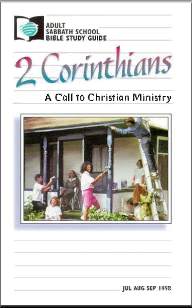2 CorinthiansA Call to Christian Ministry
Introduction |
 |
2 CorinthiansA Call to Christian Ministry
Introduction |
 |
As we glance back at our study during the first quarter of this year, we recall that 1 Corinthians gives us access to the ground floor of Christianity. We see Christianity as it grows, thrives, and spreads. We see the gospel making inroads into one of the great cites of the ancient world. In I Corinthians, Paul tries to equip early Christian disciples to live the gospel in the sophisticated culture of Corinth. He longs for his correspondents to establish a firm self-identity as Christians, one that will stand the onslaught of social pressure.
As we study 2 Corinthians this quarter, we see also Paul's reasoned arguments and enthusiasm for the gospel. All these things are present in his Second Epistle to the Corinthians. But we also find something more. We find what is perhaps Paul's most personal letter. Here we see him not only courageous and triumphant but deeply concerned and personally threatened. In I Corinthians we learn about conditions in Corinth; in 2 Corinthians we learn about conditions in Paul.
While reading this letter, it is tempting to feel disconnected from it. After
all, Paul's disagreements with the Corinthians and discussions about the
legitimacy of his apostleship are hardly front-page news today. On
second thought, though, the letter is all about ministry. And if we are to
fulfill the commission to take "this gospel of the kingdom" into "all the
world," we surely need to study it with care. From Paul's experiences as
he records them in his second letter to the church in Corinth, we may learn
the following about how to improve each of our own personal ministries:
1. What it means to minister on Christ's behalf;
2. How to create a personal ministry based on the Cross of Christ and His
resurrection;
3. What the true qualities of an effective ministry are; and
4. How our weaknesses can become the genius of our ministry. To outline 2
Corinthians in such a way may seem to miss much of the excitement that pulses
through its pages. But as you study and learn from this outline, Paul and
his emotions will become real and meaningful. You will begin to sense his
drive and relate to his mission. You will, indeed, find yourself enlisting
on Paul's missionary team, eager for the joys and sorrows of the most exciting
and demanding challenge ever to face a human being-Christian ministry.

John McVay is associate professor of biblical studies and chair of the Religion Department at Pacific Union College. He has been at the college since 1985, including a period of service as the senior pastor of the Pacific Union College church. He enjoys nothing more than participating with young adults as they grapple with the eternal themes of the Bible.
John was born in Corvallis, Oregon, to a pastoral family. He felt the call to pastoral ministry early in life, following in the footsteps of his father, Ken, and older brother, Bill. While still in college, he served as youth pastor in Des Moines, Iowa. He ministered in the Georgia-Cumberland Conference before coming to California.
John is a graduate of Georgia-Cumberland Academy, Southern College, Andrews University, and England's Sheffield University, which awarded him a Ph.D. in New Testament studies in 1995. His dissertation focused on the theme of the church in the Epistle to the Ephesians. In 1996 John was selected by the students and faculty of Pacific Union College as "Educator of the Year." He contributes regularly to professional conferences and publications.
John is married to Pam Aalborg McVay, who works part time as an obstetrics nurse at St. Helena Hospital. They have two children, Marshall and Macy. The family enjoys the great outdoors, especially camping in Northern California.
Last updated on June 7, 1998
Editorial Office: 12501 Old Columbia Pike, Silver Spring, MD 20904.
Principal Contributor: John McVay.
Editor: Philip G. Samaan .Associate Editor: Lyndelle Brower Chiomenti. Editorial
Assistant: Soraya Homayouni Parish.
Art and Design: Lars Justinen. Pacific Press Coordinator: Glen Robinson.
Copyright © 1998 General Conference of Seventh-day Adventist. All Rights Reserved.
hits since June 2, 1998.
This page is Netscape  friendly
friendly
Sabbath
School Net Home | Email Lists |
Bible
Study Guides
Bible
Study Helps | Links |
About Us |
Contact
the editors of the most recent Bible lessons
This
is an independent web site
not affiliated with the
Sabbath School Department
of the General
Conference of Seventh-day Adventists